- Home
- Mack Reynolds
Equality: In the Year 2000 jw-2 Page 6
Equality: In the Year 2000 jw-2 Read online
Page 6
Harrison didn’t even look at him. “You were a kid,” was all he said.
He leaned back to observe Julian some more. He seemed to come to some conclusion. “What do you think of our present socioeconomic system, Mr. West, after several weeks with us?” There was a cautious note in his voice that Julian couldn’t quite understand.
“Why, I suppose it’s the nearest thing to Utopia that the race has ever achieved.”
Harrison said carefully, “There have been other ‘near Utopias,’ you know.”
Julian took another pull at his drink. “It’s not my field, but… An example?”
Harrison put his elbows on the table and tented his fingertips. In a somewhat condescending manner he replied, “Ancient Egypt, for instance.”
Julian laughed a little. “Oh come now, you’re putting me on. Say ‘Ancient Egypt’ to me and the first picture that flashes to mind is an overseer with a whip giving it to a dozen slaves who are pushing an oversized cut stone along on rollers for a half-finished pyramid in the background. That’s Utopia?”
The other waggled a finger at him. “There are a good many misconceptions, even among anthropologists, about the early dynasties of Egypt. The Pharaoh was not a king, Mr. West, and the people were not slaves. Later, things were to change—please keep that in mind—but the early Pharaohs, both of the Upper and Lower so-called kingdoms, were the equivalent of tribal chieftains, elected by the clan elders. And slavery had not evolved as yet. The people were comparatively free and their institutions democratic. The clan elders were elected by the clansmen; they were not hereditary. Even Menes, the Pharaoh who is accredited with uniting Upper and Lower Egypt, was not a monarch but a revered war chief and high priest. At this stage, the Egyptians as a people maintained a surprising standard of living as compared to the rest of the world. Considering that nine-tenths of the human race at the time were wearing animal skins—the Egyptians already had cotton—and surviving as best they could in a Neolithic hunting-and-gathering economy, Egypt was a Utopia indeed. It was after the first ten dynasties or so that the democratic institutions eroded, at least in part, and the clan chiefs became hereditary, as did the Pharaohs. Slavery was introduced, though to a lesser degree than is usually supposed. The everyday Egyptian was not a slave beaten with whips.”
Julian was out of his depth. Wondering how in the hell the conversation had taken this bent, he commented, “Well, I suppose a case could be made for what you say. I suppose it’s a comparative thing—Utopia. Undoubtedly, a thousand years from now our descendants will look upon this period and consider us semi-barbarians.”
“Possibly, if this present socioeconomic system continues, Mr. West.”
Julian sipped his drink and frowned at the other questioningly. Harrison didn’t seem particularly interested in his drink, nor did Sean or the dour Ley.
Harrison said, “The pyramids of Gizeh, the greatest constructions of antiquity, were built during the Fourth Dynasty, roughly 2700 B.C. So was the Sphinx, one of the most noble pieces of sculpture ever produced. In this early Utopia of ours, art was well established. The point I was building up to is that three thousand years were to pass without any fundamental changes in Egyptian art, its sciences, its technology; in short, its way of life. There was seemingly no need for change. The Nile fed them abundantly, their clothing needs were minimal, as were their housing needs in that climate. They had it made, so to speak. Oh, there were ups and downs on the political scene. For about a hundred years the Hyksos, the so-called shepherd-kings, ruled them, and at another point the black Nubians took over. But these conquerors didn’t basically change the socioeconomic system. It was still a comparatively stilted Utopia for the average Egyptian. It wasn’t until the coming of the Greeks under Alexander and the progressive rule of the Ptolemies that Egypt began to break out of the cocoon in which she had existed for three millennia.”
“I see,” Julian said, not seeing at all. “And another example of Utopia in the past?”
Harrison thought for a moment, finally taking a sip of his drink.
“The Mayans, perhaps. They were on the scene possibly as early as 1500 B.C. One of their first cities, Tikal, in Guatemala, is also one of their most impressive. The temple of the Jaguar God is over one-hundred sixty feet, one of the highest and most beautiful of Mayan pyramids. Early in the game they reached an astonishingly advanced level of mathematics, having hit upon the zero many centuries before the Europeans had it; likewise in astronomy, in medicine, in architecture and other arts. As in the case of the Egyptians, they too had it made. Guatemala, Chiapas, and Yucatan are lush. Actually, the Mayans ate better than the Spanish at the time of the conquest. They, like the early Egyptians, had a tribal society, perhaps top-heavy with the priesthood, but the people were free. Slavery, as we know it, was unknown. Their fabulous pyramids, temples, and governmental buildings, such as the House of the Governors in Uxmal, were built by communal labor, during the months of the year not needed for agricultural work. It was, Mr. West, a Neolithic Utopia.” He paused and, without asking, dialed another Scotch for Julian.
“And so?” Julian prodded. He couldn’t get the drift. Sean had said these friends had wanted to talk about firsthand accounts of the mid-twentieth century. But here he was getting a rundown on ancient history.
Harrison went on. “One of their last cities, built shortly before the coming of the Spanish, was Mayapan. Mr. West, it was little, if at all, more advanced than Tikal. More than a thousand years earlier they had achieved a calendar more accurate than our own Gregorian, and had hit upon the zero, but where were their new advances? They had achieved a Neolithic Utopia and then they stopped. And for nearly two thousand years they remained stagnant.”
“I don’t think you’re getting through to me,” Julian said. “What’s the point?”
The other ignored him. “Now, the Incas were another thing. They too were a Neolithic people to begin with. Ambitious and aggressive, in a couple of centuries they had dominated the Cuzco valley, but it wasn’t until about 1440 A.D. that their power exploded. By 1493 they ruled from Quito, Ecuador, to the Rio Maule in Chile. Their art, particularly in metallurgy and textiles, has not been surpassed to this day. Their engineering of roads, bridges, and irrigation projects was superb. They worked copper, tin, bronze, gold, and silver and knew smelting, alloying, casting, inlaying, soldering, riveting, and incrustation. Their medicine too was higher than the level that prevailed in Europe at the time and their diet was superior. They had even taken to the sea and evidently had craft capable of crossing the Pacific, as noted in Hyderthal’s Kon Tiki experiment. However, the Inca civilization was no stagnant Utopia, Mr. West, but a vital, expanding, healthy society on its way into the future. In many respects it is a pity the Spanish arrived when they did with their superior weapons. It would have been historically interesting to see what the Incas could have accomplished.”
“Your point?” Julian said impatiently. His new drink had arrived and he began on it.
“My point is,” Harrison said, “that man cannot afford Utopia. Man is an aggressive, impatient, striving animal and has been since he issued forth from the caves to conquer his world. He cannot afford to hesitate, to speak of coming to a halt. If he does, he stagnates and eventually dies—as the Egyptian culture died, as the Mayan culture died.”
Sean O’Callahan and the quiet Ley nodded. “Yes,” Sean agreed. “A Utopia dies.”
Julian thought that possibly at last they were getting to the point of this meeting.
He said, “This particular Utopia doesn’t seem to be dying. It’s developing like crazy in all directions.”
Harrison shook his head. “No. Not as it should be. Ninety-eight percent of our population is not being utilized. They sit around doing make-work. Our civilization is stagnating, Mr. West.”
“Yeah,” Ley echoed. “Back in the 1960s and earlier, if somebody had it on the ball, he could fight his way to the top, make his mark on the world. Look at Hitler. Started off as a poor boy and fought his
way up to be the most powerful man in the world. And he didn’t need any goddamned computers to tell him whether or not he could do it.”
Sean laughed lightly. “Not exactly the example I would use,” he said.
William Dempsey Harrison brought forth his transceiver and flicked the stud for the time. “I’m afraid I’m going to have to be running along.” He looked at Julian. “There’s quite a bit more I wanted to discuss with you, but perhaps you’ve got enough to reflect upon. Can we get together again?”
“Why, of course.” In actuality, Julian didn’t know exactly where he stood with this man, or how he felt about him. Obviously, the other wasn’t satisfied with the status quo. Thus far, Julian West had met only the Leetes, who were. He wouldn’t mind knowing a bit more about what was wrong with Utopia.
Harrison stood. “I’ll get in touch through Sean, here.” He hesitated. “Meanwhile, if you don’t mind, I’d appreciate it if you didn’t mention this conversation to any of the Leete family.”
Chapter Six
The Year 1968
The session with Harrison, Ley, and O’Callahan hadn’t left him feeling very balanced. On his return from the Cub Bar he had gone immediately to bed, only to have one of his worst nightmares ever.
Though all of the war dreams were bad, it was the worst. Certainly it was one of the longest. It invariably started at the same point and ended at the same point, and it always took long minutes to get over.
Captain Julian West returned to Fire Base 2224 in a slick (as the grunts called helicopters) that was large enough to hold six men. It was equipped with sliding doors on both sides. These were open so that the two gunners, who were strapped to either side, could lean out and fire their .30 caliber machine guns if required.
Julian had spent almost two weeks at the hospital in Truj Hoa and then pulled down another week of R R—rest and relaxation—in Bangkok. Actually, it had been only a minor wound but he was returning with a Bronze Star, a Purple Heart, and, of all things, the Vietnamese Cross of Gallantry; none of which he would bother to mention to his buddies, not particularly wanting to be laughed at.
The chopper swooped into the LZ, the helicopter landing zone for the fire base. The pilot didn’t bother to turn off the engine. Julian West took up his duffle bag, waved a brief good bye, and jumped to the ground. The usual cloud of whirling dust, pieces of paper, and dry sticks were being kicked up by the aircraft’s blades. He waded hurriedly through the dust as fine as a dark red talcum powder.
Three weeks hadn’t much changed Fire Base 2224, although they seemed to have thrown up more entrenchments and strung more wire. He wondered if Charlie was still giving them a hard time. The fire base was located on a hill in the jungle south of Cheo Reo and for the first month or so that the Americans had occupied it, the Viet Cong hadn’t been very active in the vicinity. The ambush in which he had been hit had come as a surprise.
There were twenty pieces of artillery and fifteen mortars, the latter of which looked like nothing so much as black stovepipes about three feet high. The artillery crews managed to keep the black guns spotless, in spite of the red dust, by endlessly wiping them with oil rags.
Julian made his way toward his billet. He didn’t know if the colonel would be on the hill or not, but he figured on leaving his bag and possibly cleaning up a little before reporting in. The bunkers were little more than big holes in the hillside, covered with logs and heaped high with sandbags. He assumed his billet which he shared with Lieutenant Chenowith, one of his subordinates, was still being retained for him.
He peered down. “Jesus Christ, it’s Jule,” Turk Chenowith exclaimed, “I thought you got yourself a nice deal back in Saigon. What’d you want to come back here humping around the jungle for?”
“Nice deal? That’ll be the day,” Julian said, tossing his duffle bag to one side. “I was shafted.”
“Here, have a can of beer,” lurk offered. He was a small man, the wonder of the company: somehow he managed to be a dandy, even in combat areas. Somehow his uniform was always impossibly neat; somehow he found water with which to shave and wash.
Now he took up a can of beer from an open carton, popped it open and handed it over.
Julian took it gratefully and sat down on one of the empty wooden boxes the bunker boasted in the way of furniture. “What’s been happening? Made any new contacts since I’ve been gone?”
Turk wiped his mouth with the back of his hand. “Pretty bad, but nothing for the last few days. In our company, Buck Dillard’s been wasted. Took a handful of rocket frags in his chest. Sergeant Karp and three of his men ran into a whole company of NVAs and had to be dusted off in a Medevac chopper. D Company’s had even more casualties than we have. They lost Captain Somerlot.”
“Waxed?” Julian asked, pulling at his beer.
The other shook his head. “No. He took three hits in his right leg. They got him back to the base hospital okay, but he was bleeding like a stuck pig from an artery hit up near the groin. He’ll never be back; he’ll lose the leg. Lucky bastard.”
Julian stared at him.
Turk opened another can for himself before he said, “What the hell, I’d trade a leg to get out of ’Nam.”
Julian finished his beer. “Is the colonel up at the command post?”
“Yeah. At least he was there half an hour ago. He’s sent out D Company to see if they can make contact.”
Julian came to his feet. “I better report in. Who’s been in charge of the company?”
“I have.”
“Any replacement for Buck Dillard yet?”
“No. And none for Sergeant Karp, either. He was the best grunt in my platoon. He was crazy to have stayed in after getting through Korea.”
Just as Julian got ready to leave the bunker, a grunt stuck his head down and yelled, “Incoming! We got incoming!”
“Any better place to be than here?” he asked Turk.
“Hell no. I’ve got enough sandbags on this bunker to stop a direct hit from a 122 millimeter rocket—which, by the way, the Chinese are evidently supplying the NVAs with in this vicinity.”
“Great,” Julian muttered. He raised his head from the bunker. He could hear the whistle of the rockets. You couldn’t see them but you sure could hear them. There was a bright blue flash not so far off and the ground heaved. He threw himself back and down. It had been a close one, all right: he could hear clods of earth that had been thrown high, falling back to the ground, and the smell of smoke was in the air.
There was a small PRC-25 radio in each bunker housing an officer or non-com. It squawked now, then, “Lieutenant Chenowith? Colonel Fry. I’m at the command post. Get over here on the double.”
“Yes sir. Colonel…?”
Julian could sense the impatience in the strained voice. “Yes?”
“Captain West has just returned. He’s here.”
“Oh? Well, send him over instead. You stay where you are. We’re short of officers. I don’t want to lose both of you.”
Julian eyed his lieutenant in disgust. “My pal,” he muttered. “Listen to all that stuff going off out there.”
Turk put his hand over his heart. “Better you than me, sir.”
Julian took up his steel pot and put it on his head. He grabbed up an M-16, and a bandolier of ammo which he slung over his shoulder. He worked a shell into the chamber from the eighteen-round magazine before leaving the shelter of the bunker. It was a light gun, a result of the stock and grip being made of fiberglass, of 5.63 millimeter caliber. It made quite a difference in combat; a man could carry double the ammunition that had been possible with the heavy Garand of the Second World War and Korea, with its .30 caliber.
Crouching under fire, he ran desperately for the command post some two hundred yards up the hill.
Company D had made contact with a thus far undetermined number of Charlie. Air support had been called in and even as Julian entered the jungle with Company B, he could see five jets flying over, going like a flash. In the
distance, they peeled off and went in for the kill, firing their machine guns and two rockets each. Bombs as well, judging by the sound of the explosions. And at least one must have dropped a barrel of napalm, he figured as a burst of orange and black erupted over tree level.
The artillery on the fire post was also in action now, the deafening sound a welcome change from the detonations of the 122 millimeter Chinese rockets that had slammed into the base.
Company B marched into the jungle in the usual manner: three columns, right flank, center file, left flank. Julian West and Sergeant Carl Teichert led the center file. Usually they couldn’t see the men on the flanks because of the trees, vines, and underbrush. In fact, since the men were spaced approximately thirty feet from each other, they couldn’t see many in their own column.
Julian alternated with the sergeant as point man. He carried the M-16, his favorite weapon. Flick the selector on AUTO and press the trigger and you could empty the eighteen-round magazine in something like a second. Of course, that wasn’t the usual way you did it, particularly when firing at a definite target. The thing was to press the trigger lightly, a mere flick and then release it, which gave you a burst of three or four rounds.
Sergeant Teichert carried a CAR-15, his own favorite. Behind him Forry Jackson had an M-16 with an over-and-under grenade launcher attached to it. Next came another grunt rifleman and behind him a crew of three men with an M-60 belt-fed machine gun.
The center file was the safest if they ran into an ambush—and in this jungle a hidden Charlie could be as little as ten feet from you without being detected until he started firing. It would most likely be the right or left flank that got it first.
The sergeant, an old combat buddy, had protested Julian’s taking the lead, although he usually did.
“Fer Chrissakes, sir, you’re the captain. You give the orders. Send us grunts in. We lose you and we don’t have no officer.”
“I don’t like to send a man in where I’m afraid to go myself.”

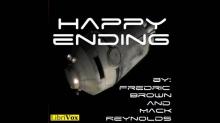 Happy Ending
Happy Ending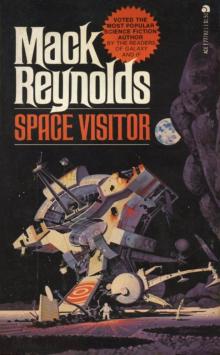 Space Visitor
Space Visitor A Kiss Before Loving
A Kiss Before Loving Episode on the Riviera
Episode on the Riviera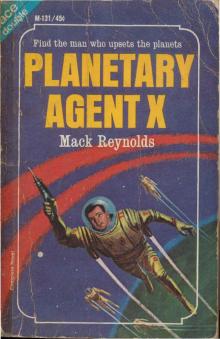 Planetary Agent X
Planetary Agent X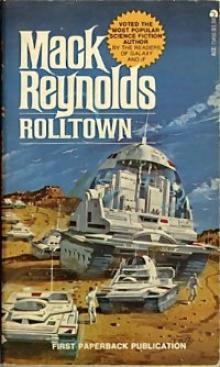 Rolltown bh-3
Rolltown bh-3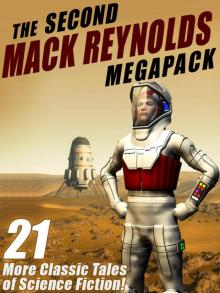 The Second Mack Reynolds Megapack
The Second Mack Reynolds Megapack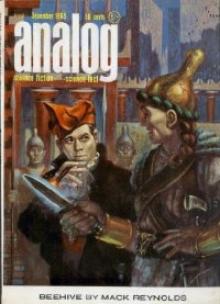 Dawnman Planet up-2
Dawnman Planet up-2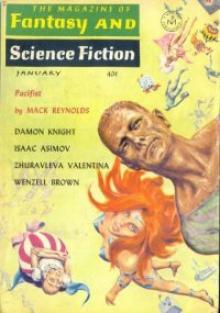 Pacifist
Pacifist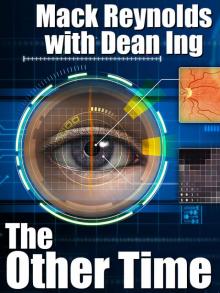 The Other Time
The Other Time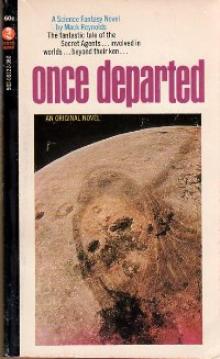 Once Departed
Once Departed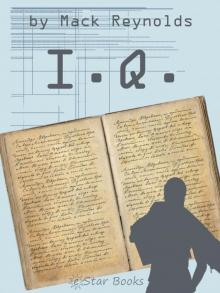 IQ
IQ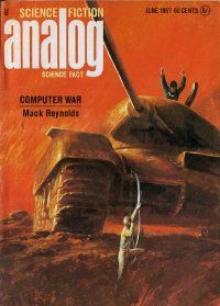 Computer War
Computer War Earth Unaware
Earth Unaware The Rival Rigelians up-3
The Rival Rigelians up-3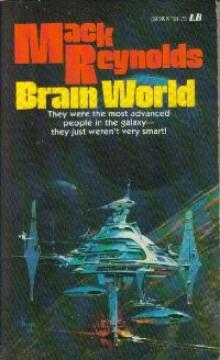 Brain World up-7
Brain World up-7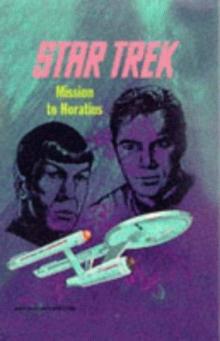 Star Trek - TOS - Mission to Horatius
Star Trek - TOS - Mission to Horatius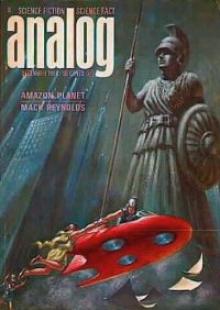 Amazon Planet up-5
Amazon Planet up-5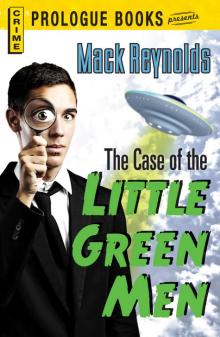 The Case of the Little Green Men
The Case of the Little Green Men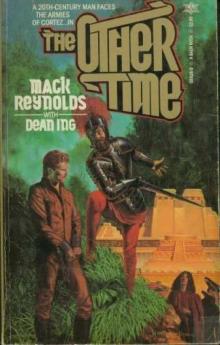 Other Time
Other Time The Mack Reynolds Megapack
The Mack Reynolds Megapack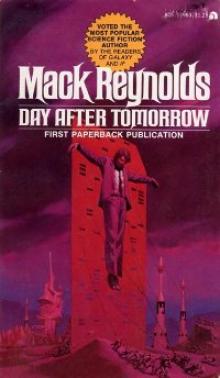 Day After Tomorrow
Day After Tomorrow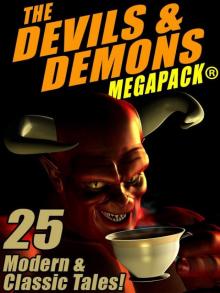 The Devils & Demons MEGAPACK ®: 25 Modern and Classic Tales
The Devils & Demons MEGAPACK ®: 25 Modern and Classic Tales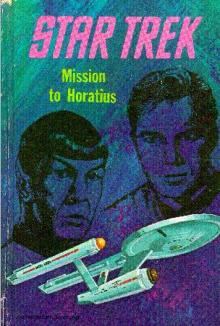 Mission to Horatius
Mission to Horatius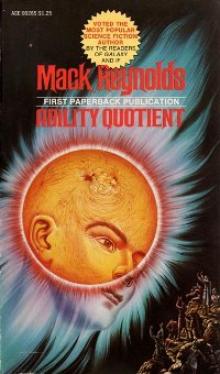 Ability Quotient
Ability Quotient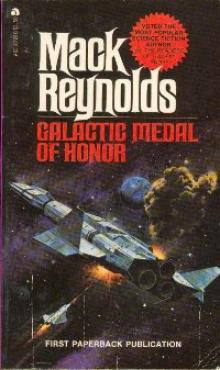 Galactic Medal of Honor
Galactic Medal of Honor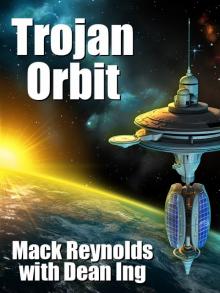 Trojan Orbit
Trojan Orbit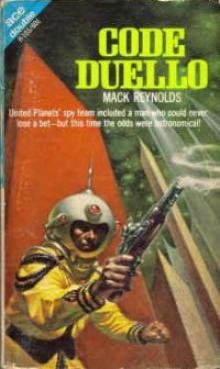 Code Duello up-4
Code Duello up-4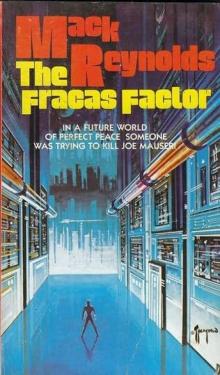 The Fracas Factor
The Fracas Factor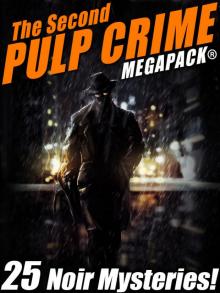 The Second Pulp Crime
The Second Pulp Crime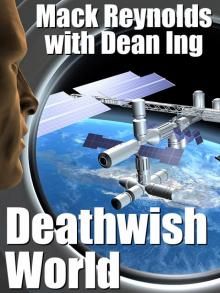 Deathwish World
Deathwish World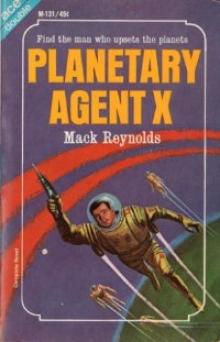 Planetary Agent X up-1
Planetary Agent X up-1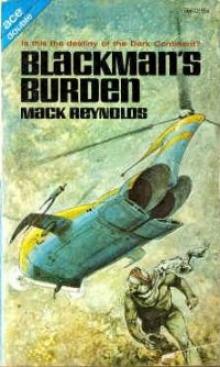 Blackman' Burden na-1
Blackman' Burden na-1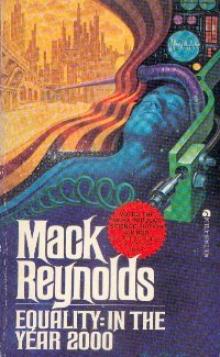 Equality: In the Year 2000 jw-2
Equality: In the Year 2000 jw-2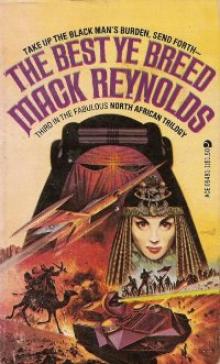 The Best Ye Breed na-3
The Best Ye Breed na-3 The Jet Set
The Jet Set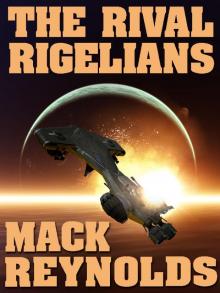 The Rival Rigelians
The Rival Rigelians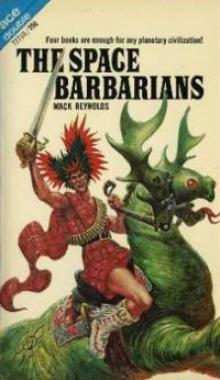 The Space Barbarians
The Space Barbarians